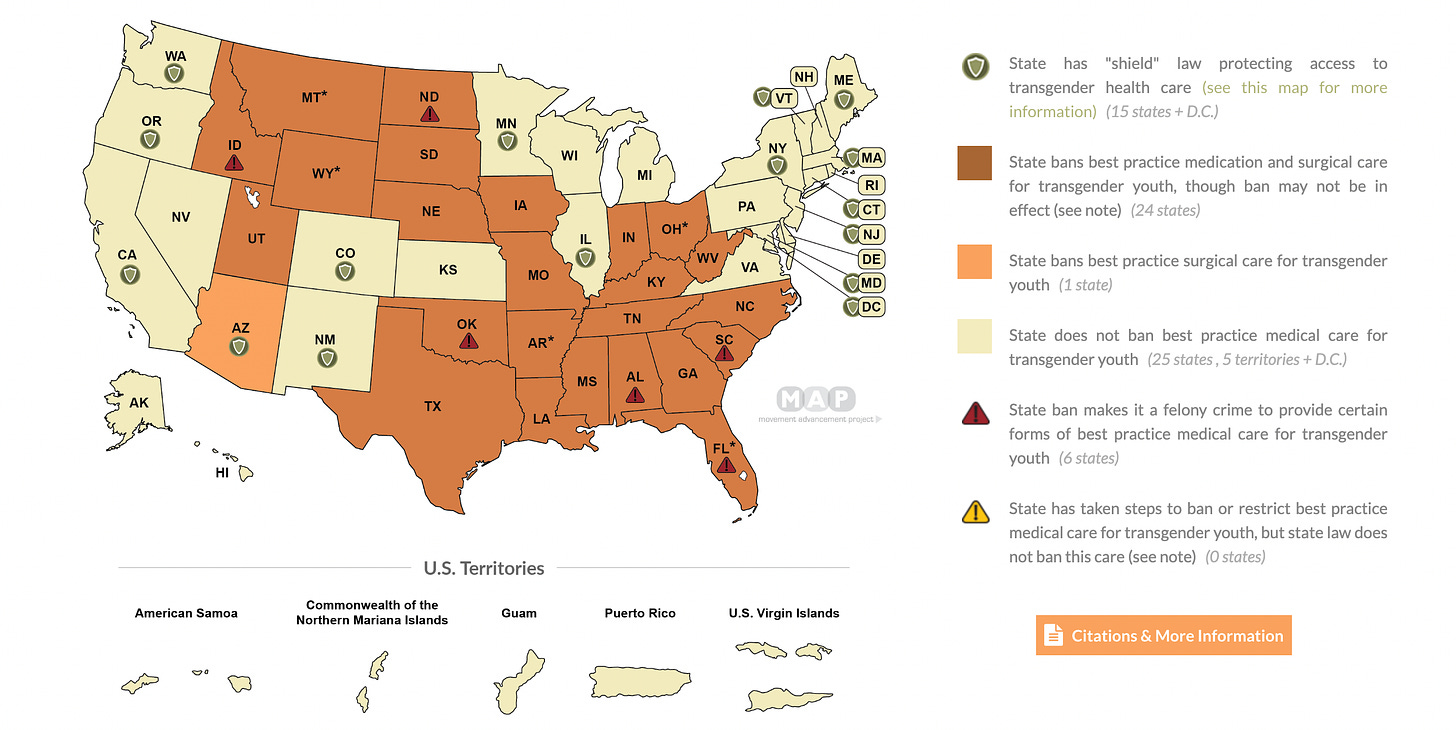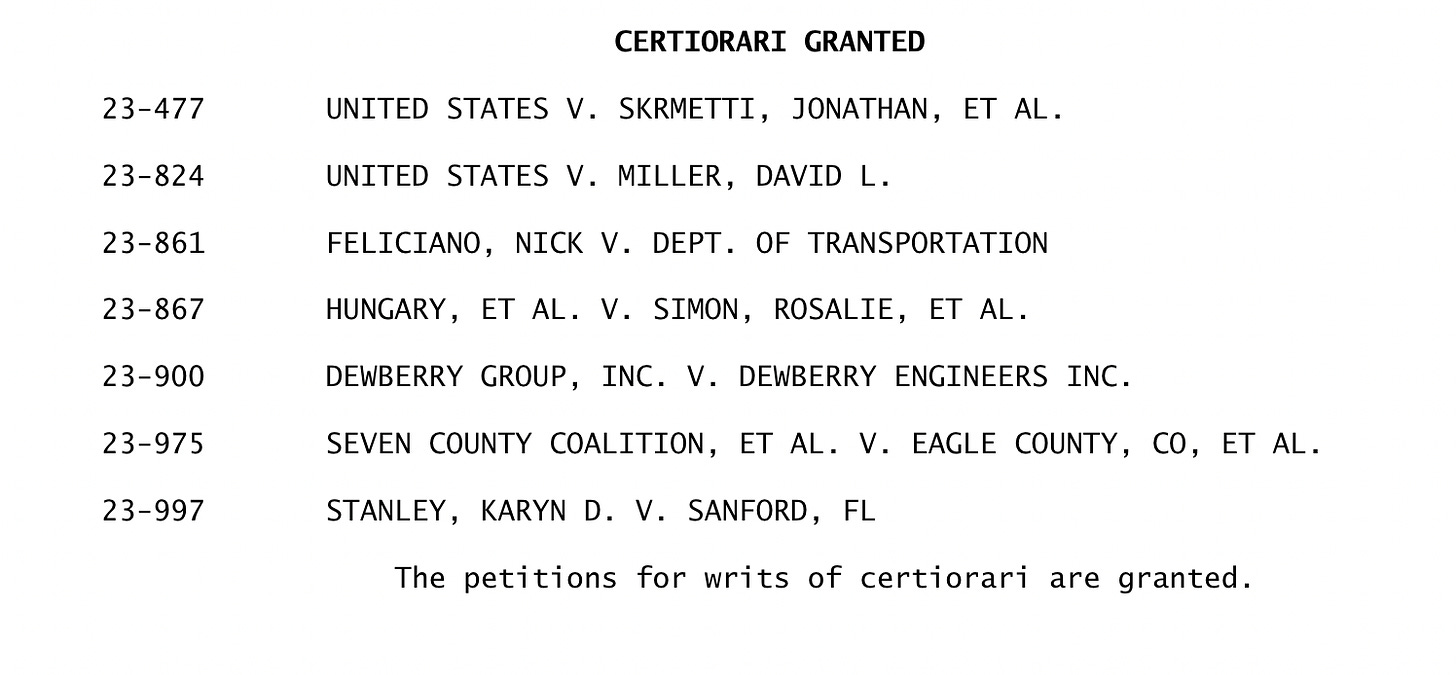Before they leave on summer holiday, the Supreme Court typically sets up their docket for the coming term, which will begin in October of this year and conclude in June, or thereabouts, of 2025. As of last Monday, they had granted certiorari, or cert, in 16 cases. There were seven new grants today.
The Court’s website notes that it receives approximately 7,000-8,000 petitions from parties who want the Court to hear their cases each term. The Court hears around 80 cases each term, so they’re a bit light at the moment, even if you count cases that crop up midterm, like this term’s Colorado ballot case and the presidential immunity appeal.
There’s still the “Clean Up” conference, currently scheduled for next Monday, where the Court can add additional cases to those it will hear next term. There is always interesting fallout as the Justices grant cert in some cases and deny it in others. The Justices who disagree with the denials occasionally weigh in with some fervor.
One case we do know the Court will hear next term, because they granted cert Monday morning, is a challenge to the Tennessee law that ends transgender minors’ access to gender-affirming care. The law bans care ranging from hormone treatments to gender-transition surgery. Tennessee is not alone in banning this care. The Court’s decision will likely impact other states like Alabama that have already implemented bans, which are currently being hotly contested in the lower courts, as well as other states that are planning to pass them. Bans on care are in place in roughly 24 states.

The cert grant for this case came as part of a ten-page orders list that includes grants and denials in numerous cases. You can scroll through the list here to see what this part of the process looks like. In many cases, you’ll see that the Court grants cert, only to “vacate” the judgement, which frequently means they are tossing out the lower court’s judgment and returning the case to them to decide again because the Supremes have issued a new decision that will impact the outcome of the case. Decisions issued this term begin to have immediate impact on other cases, which is how precedent works.
As we’ve noted previously, Steve Bannon has a July 1 date for reporting to federal prison despite his efforts to get that extended. He’s now taken his request to avoid prison to the Supreme Court. It’s highly likely we’ll hear from the Court on that later this week. The government has until 4:00 p.m. on Wednesday to respond to Bannon’s petition.
Bannon was convicted almost two years ago, in July 2022, but he’s managed to avoid serving his four-month sentence so far. District Judge Carl Nichols gave him a bond during his appeal. His case in the Court of Appeals is now concluded—they ruled against him—and there’s nothing special about this case that makes it one we’d expect to go any further. Bannon filed an emergency application for continued release last Friday after both Judge Nichols and the Court of Appeals turned him down. It’s likely we’ll get a shadow docket ruling, which may or may not include any sort of written opinion, later this week.
Finally, Justice Alito was absent from court for two days last week. No word on why. We’ll see whether he is present this week. The larger question is whether he and Justice Thomas, neither one of whom should arguably be participating in the Trump-related cases at this point, have recused from them. That seems highly unlikely.
The Court could clear the remaining cases on its docket this week if it hands down four opinions a day beginning on Wednesday, but will they do that? Thursday is the first presidential debate night, and it’s easy to envision Chief Justice John Roberts being squeamish about injecting the Court into that spectacle. This afternoon the Court added on Thursday or Friday as decision days, but there is no guarantee they will announce all opinions in remaining cases this week. We could find ourselves heading into the weekend without knowing whether the Court thinks Donald Trump is entitled to presidential immunity for his efforts to interfere with the outcome of the 2020 election. Personally, my mind was made up long ago.
For appellate geeks like me—I spent part of my career at the Justice Department running the appellate division in the U.S. Attorney’s Office in North Alabama—the Court’s calendar becomes a part of your internal clock. But I recognize for people, even lawyers, who don’t do this kind of work, there can be lots of questions. If you have any, please leave them in the comments, and I’ll get to as many of them as I can as I write about the finale of this term of Court.
We’re in this together,
Joyce





So much to think about!!! As an uneducated in the law plain citizen, I so appreciate each installment of the explanations you provide. While I’m not ready to argue a federal case, I feel so much more prepared to understand all that is happening. Thank you Joyce!!!
I'm absolutely amazed the court would even hear Steve Bannon's petition. I hope the fact that he was convicted in the border wall fraud case can be considered as a factor against him.